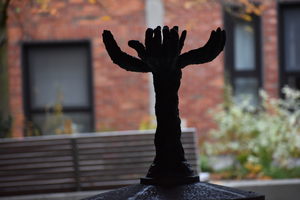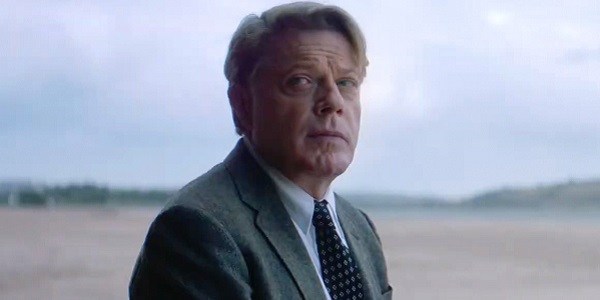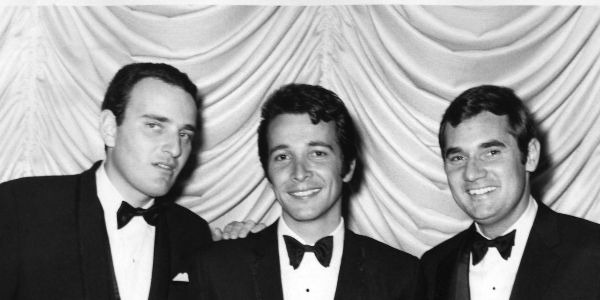ALLEN V. FARROW, Episode Two: The Soon-Yi Affair
If there was one core argument Woody Allen made in his defense during the course of litigation against him, it would be fair to say it was the “woman scorned” argument. There has been an implication by some on Allen‘s side – including Allen himself – that the accusations of sexual abuse were a proxy for the real issue: Allen‘s affair with Mia Farrow‘s daughter Soon-Yi. For this reason, the Soon-Yi affair is a particularly interesting aspect of Allen v. Farrow, and it’s the main topic discussed and dissected in this, the second episode.
We start with a homemade video on Farrow‘s Connecticut property; a video of her children playing a game. The kids are relaxing peacefully by the lake when a monster emerges from the water (one of the children, donning a homemade costume of a black overall, and wielding a pair of flippers) and chases the children. Farrow narrates the scene as though it were from a movie: “A monster rose from the deep”, she cries, “everyone ran! The house was in pandemonium! They ran for cover but the monster steadily followed them”. Then we cut to an interior of the house, the children lying dazed on the floor in a heap. “Everyone in the house was soon quite horribly dead”, Farrow narrates, as the camera pans up to see the monster standing over the children, “and the monster was full”. It wouldn’t be unreasonable to assume the allegory here paints Allen as the monster whose actions consumed the household. It also wouldn’t be unfair, either. Allen’s own actions with Soon-Yi were unarguably what began this whole mess.
The Family Farrow
Unsurprisingly, the focus throughout is on family: early scenes see Farrow discuss the large family she grew up in (she was one of seven children, born in the middle). This dynamic instilled in Farrow a longing to start a family of her own. Whereas the first episode showcased more of Allen‘s work, the second episode more heavily documents Farrow‘s career, from her beginnings on a TV show called Peyton Place, through to Rosemary’s Baby and her relationship with Frank Sinatra. This relationship, we’re told, thrust Farrow into a limelight she was ill-prepared for, while her role on Rosemary’s Baby – a role which made her a star – only served to increase that limelight. She retreated from that fame, amid the breakdown of her marriage to Sinatra, and found a more quiet, homely life with composer Andre Previn. “I wasn’t just an ungrateful movie star”, Farrow says of that period of time, in which she gave birth to twins, “I was mom”.
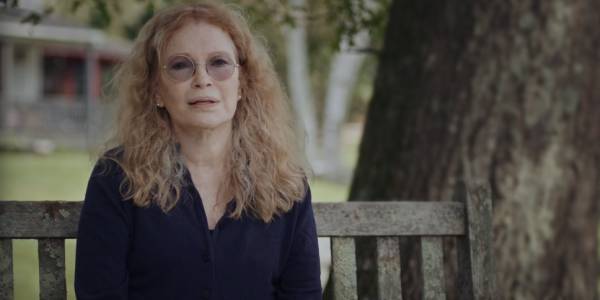
Adoptions soon followed, as Farrow watched the horrors of Vietnam play out and children all over the country were left orphaned. She adopted Lark, and then Daisy (who provides a voice-over here of her early days; Lark sadly passed away in 2008). By and large, she had the family life she had been seeking for so long. And then came Soon-Yi.
Soon-Yi was older than Farrow‘s other kids when she was adopted, it’s explained. She was abandoned by her mother in Korea, and Farrow flew over to take her in. Audio recordings of the child Soon-Yi explaining that her mother did not want to hug her, or refused to feed her if she did something wrong, are heart-breaking. Especially when told by such a sweet, innocent child (although Soon-Yi disputed the veracity of this in an interview in Vulture back in 2018, where she claims Farrow would ask her to make up fake details for a videotape). Farrow describes her relationship with Soon-Yi as difficult because Soon-Yi was older and perhaps a little more traumatized by her early experiences; Farrow kept Soon-Yi by her side at all times, hoping to create a bond with the girl. Daisy provides more context when she recounts that Soon-Yi was “always standoffish” and “had a lot more angst”. Family friends paint a picture of a very quiet girl – especially in contrast to her more outgoing siblings Daisy and Lark – who didn’t date boys, and was “very innocent”.
Farrow’s relationship with Previn soon ends, as Farrow informs us that he fell in love with her best friend (throughout both of the first two episodes there is a constant thread of victimhood from Farrow, who robs herself of any agency, instead insisting these events were pressed upon her, implying what became of her was wrought by those events). Enter Woody Allen.
Manhattan
Much is made of Allen‘s rising star at the time his relationship with Farrow began. He had just achieved resounding success with Annie Hall, making him even more of a critical darling, and then went on to make the similarly well-received Manhattan. The opportunity to analyze Allen here is rife: “Manhattan is an interesting film to look back at” says Alissa Wilkinson. She’s not wrong. Manhattan is about a man in his 40s (played by Woody Allen) who is dating a 17-year-old, with all the neurosis and self-recrimination you might imagine from Allen. It’s not hard to consider Manhattan as Allen playing out a fantasy of his, something he would later go on to enact with Soon-Yi (who wasn’t much older than 17 herself at the time the affair began). Wilkinson makes a good point that with Manhattan, Allen may be trying to get the audience “acclimated to the idea” of May-December relationships, a way to legitimize his own desires.
We’re soon introduced to Christina Englehardt, who claims she had an affair with Allen when she was a 16-year-old high school student, and who is – reputedly – the inspiration for Manhattan. Englehardt recounts her own brutal past, having experienced rape on a number of occasions, and says that she trusted Allen. She refuses to label the experience as right or wrong, solely stating that it happened. She’s a very compelling interview subject, and very insightful about her own life. Interestingly, she says she would absolutely refuse to let her daughters date an older man – which might say something about her relationship with Allen.
There are then more allusions to impropriety in Allen‘s work, in his movies as well as the descriptions within his script. It certainly shows a man obsessed with young women, to a very unhealthy degree. It’s long before this ties back to Soon-Yi, after having built up the plausible idea that he had a history of this behavior to begin with. A particularly gross excerpt from Allen‘s book finds him discussing Soon-Yi‘s “latent potential”, a woman “ready to ripen superbly”. It sends shivers down the spine to hear it.

The question of when the relationship began swirls around the later half of this episode: while Allen claims the relationship began in December of 1991, there are claims from the Farrows to the contrary. We are informed here that Allen‘s doorman had reported seeing Soon-Yi enter and exit Allen‘s building many times during her senior year of high school, a year or so earlier than Allen‘s account. This distinction is never cleared up – nor can it ever be – but Amy Ziering and Kirby Dick set out the facts of court testimony: while Allen‘s doorman claimed to have seen Soon-Yi, Allen‘s housekeeper claimed to have found semen stains on the bedsheets, and condom wrappers in the wastebasket. Again, all damning statistics, but where is the balance? The fact that we have not heard any defense from anyone on Allen‘s side means any information collated here must be taken with a grain of salt.
Finally, we reach the apex (or nadir depending on your point of view) of the episode: the immediate fallout from the revelation of the Soon-Yi affair. Fletcher Previn – Farrow‘s son – speaks for the shock of the children when Farrow tells them what happened. Then we are shown recorded phone calls between Farrow and Allen in which Allen expresses his desire to “put this all behind us” and “get back on track”. Farrow explains the taping as pre-empting what she believed to be Allen‘s own attempts to tape her. The revealing phone conversation sees them attempt to control the PR spin on the situation, discussing what label to apply “We’ll I’m not going to say I had sex with Soon-Yi“, “are you gonna call it an affair?” “Certainly”.
What Happened To Dylan?
Dylan, so far absent, makes her appearance near the end – a devastating bookend to a, particularly nebulous episode. She recounts an experience where Allan shoved her head into a plate of hot spaghetti as punishment for referring to him as Woody instead of Daddy. Now Ziering and Dick have moved on from Soon-Yi back to Dylan and the fateful day where the abuse is alleged to have taken place.
The testimony of Kristi Groteke – babysitter for the Farrows – is shown on screen: she recalls searching throughout the house for Dylan on the day in question, calling out her name as she entered each room but hearing no response and unable to find her. The period of time – she says – in which Dylan was missing was “roughly 20 minutes”. When she did appear, Farrow noticed she was not wearing underwear. Another babysitter, Alison Stickland, raised the alarm to a family friend Casey Pascal about what she perceived to be inappropriate behavior from Allen towards his daughter. Pascal then told Farrow, who put two and two together and then made a video of Dylan responding to Farrow‘s questions about the incident.
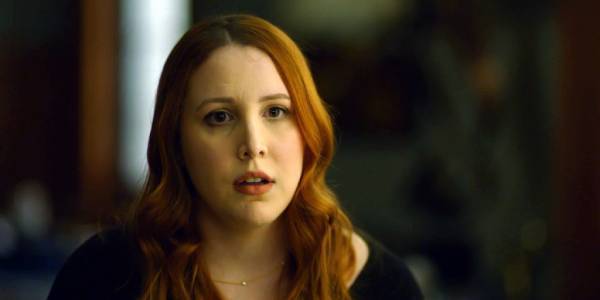
“He touched my privates” we hear a nervous Dylan inform the camera. “And then he was breathing on my leg”. Much has been made of these tapes too, including the suggestion that Farrow had asked leading questions of Dylan and potentially corrupted the pool of information, opening Dylan to a high level of anxiety. Indeed Lt. Richard Marcus of the New York police department believed Dylan “lacked credibility” since the questions were asked by Farrow and the responses given were not indicative that the incident had happened. This is another instance, unfortunately, of the one-sidedness which plagues Allen v. Farrow, and means the record is anything other than definitive. As the episode closes there are a few different videos of Dylan‘s testimony caught by Farrow‘s camera, and as difficult as it is to watch it’s also fascinating to understand if the allegations of being coached have any merit. Farrow herself closes the episode, expressing her confusion that someone she knew so well could commit so heinous a crime.
Conclusion
Unfortunately, it does not appear that Allen v. Farrow will come anything close to a balanced look at what is a complicated, messy situation with many moving parts. Ziering and Dick have, it feels, missed a real opportunity to provide an impartial, objective view. Instead, we are given many details – some of which have already been disproven or taken out of context – that condemn Allen as a devious predator, without allowing for any voice from the other side. Perhaps – as is reportedly the case – Allen and Soon-Yi both denied the opportunity to take part, but even without their input, it was possible to convey a more balanced tone.
As we go along with each episode, we’d love your views on the documentary and the wider drama as a whole. Please let us know your thoughts in the comments below!
Allen v. Farrow is available to watch now on HBO Max
Watch Allen v. Farrow
Does content like this matter to you?
Become a Member and support film journalism. Unlock access to all of Film Inquiry`s great articles. Join a community of like-minded readers who are passionate about cinema – get access to our private members Network, give back to independent filmmakers, and more.
Join now!

